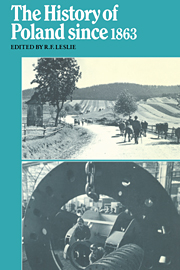Book contents
- Frontmatter
- Contents
- List of maps
- Preface to the paperback edition
- Abbreviations
- Map 1 Poland in the nineteenth century
- 1 Triloyalism and the national revival
- 2 Poland and the crisis of 1900–7
- 3 Poland on the eve of the First World War
- 4 The emergence of an independent Polish state
- 5 The breakdown of parliamentary government
- 6 Piłsudski in power, 1926–35
- 7 Poland without Piłsudski
- 8 Poland in defeat, September 1939–July 1941
- 9 The ill-fated alliance, August 1941–April 1943
- 10 The years of Tempest, May 1943–December 1944
- 11 Post-war Poland
- 12 The rise and ebb of stalinism
- 13 The October turning point
- 14 ‘The little stabilization’
- 15 The decline of Gomułka
- 16 Poland under Gierek
- 17 Polish society, 1945–75
- Epilogue: The rise and fall of Solidarity
- Notes
- Select bibliography
- Index
Epilogue: The rise and fall of Solidarity
Published online by Cambridge University Press: 26 December 2009
- Frontmatter
- Contents
- List of maps
- Preface to the paperback edition
- Abbreviations
- Map 1 Poland in the nineteenth century
- 1 Triloyalism and the national revival
- 2 Poland and the crisis of 1900–7
- 3 Poland on the eve of the First World War
- 4 The emergence of an independent Polish state
- 5 The breakdown of parliamentary government
- 6 Piłsudski in power, 1926–35
- 7 Poland without Piłsudski
- 8 Poland in defeat, September 1939–July 1941
- 9 The ill-fated alliance, August 1941–April 1943
- 10 The years of Tempest, May 1943–December 1944
- 11 Post-war Poland
- 12 The rise and ebb of stalinism
- 13 The October turning point
- 14 ‘The little stabilization’
- 15 The decline of Gomułka
- 16 Poland under Gierek
- 17 Polish society, 1945–75
- Epilogue: The rise and fall of Solidarity
- Notes
- Select bibliography
- Index
Summary
The ‘serious confrontation with the working class’ predicted in chapter 17 duly occurred in the summer of 1980. In late 1978 the Polish Cardinal Karol Wojtyla was elected Pope and his visit to his native country in June 1979 produced an upsurge of national pride and unity. The party leader Gierek hoped to reap some popularity from the visit but the grim economic reality and the government's apparent powerlessness had made his leadership completely discredited in the country and the party. By mid-1980 the economic problems of the country had become so serious, with hard-currency indebtedness above $21,000 million, that a new austerity programme could no longer be postponed. An increase in the price of meat introduced on 1 June was the beginning of it and led to protests and strikes which at first lacked clearly defined political objectives; however, four years of political agitation since the upheavals of 1976 had made an impact. When the Gdańsk shipyard workers went on strike in mid-August, they very quickly formulated a mixture of economic and political demands, calling among other things for the setting up of independent trade unions with the right to strike and demanding the restriction of censorship to state secrets of a military or economic nature and that appointments be made purely on merit. Similar demands were put forward by the Szczecin shipyard strikers.
- Type
- Chapter
- Information
- The History of Poland Since 1863 , pp. 458 - 462Publisher: Cambridge University PressPrint publication year: 1980



